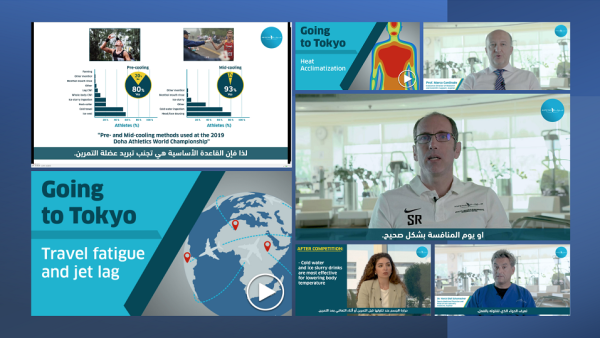Aspetar Experts Provide Athletes With Vital Advice Ahead Of Olympics Tokyo 2020

Aspetar experts provide athletes with useful information to help them prepare the biggest sporting event in the World. The series of tips provide expert advice and information to keep athletes safe during the COVID-19 pandemic, and tools to help athletes perform at their best.
Through its social media platforms, Aspetar experts are highlighting some advice that can help athletes and coaches in their final preparations; addressing a number of topics related to athlete wellbeing at the preparation stage and during competition, in order to help athletes on and off the field of play.
Prof. Marco Cardinale, Executive Director of Research & Scientific Support, was asked how best to utilise scientific support for athletes at this time:
“We all need support during these extraordinary times, and with the Olympics approaching it is extremely important for athletes and coaches to be able to optimise the training process. What you want to avoid as an athlete is to experience overtraining, compromise your preparation, and arrive to the Olympic Games with some injuries or illness. Training load monitoring is one of the activities that your coaching staff and your support staff can put in place for you and what they should focus on is two main aspects: how you are coping with the training and most of all what you are doing in the training so your performance can be optimised.”
Tokyo 2020 will be hot and humid, and performing in hot and humid conditions presents a variety of challenges. Endurance events are particularly challenging due to chance of athletes experiencing heat cramp, heat exhaustion, and heat stroke. Aspetar experts put together tips and recommendation based on years of research and experience in hot environments.
“There is a range of methods available to prepare athletes perform in hot environments from natural heat adaptation, that is the most specific one, to the simplest ones like maybe just over dressing and exercising indoor with some heaters. Everybody can simulate the heat, and everybody can adapt to the heat,” says Dr Sebastien Racinais, Head of research.
A key issue in competing in hot climates is preventing dehydration during competition and training. Aspetar experts offer nutrition guidance to athletes, and nutritional strategies play an important role in supporting athletes to perform as well as possible in extreme environments.
Nelda Nader, Aspetar nutritionist, says: “Athlete performance is built on many factors; genetic, hard training, discipline, agility, speed, power, right mindset, and many more. Optimising training adaptations requires detailed nutritional plans which are also important on race/competition day.”
Consuming unknown food sources and unwashed food whilst travelling can lead to foodborne infections and gastrointestinal issues, one of the more common types of illness competitors will encounter.
Experts advice athletes not to eat street food if they aren’t sure of its origin, to make sure that all food is either washed or boiled before eating, and to wash or disinfect hands before touching anything before eating it.
Dr Yorck Olaf Schumacher, Head of Subspecialty Medicine, stated: ‘Many things have to be taken into consideration, such as medication, before and during the competition. There is obviously the wider list of prohibited substances that you have to abide by, and some substances are not allowed in competition, or out of competition, and it is very important to check this before travel to the Olympic Games. The same applies to nutritional supplements as they may contain forbidden substances. Another important thing is to avoid risky situations for respiratory infections, particularly during the COVID-19 pandemic.”
More tips and recommendations broadcast on Aspetar social media platforms
Background Information
Aspetar
Aspetar is a world leading specialised orthopaedic and sports medicine hospital, and the first of its kind in the Middle East. Since 2007, with a world expert team, the hospital has provided top-level comprehensive medical treatment to all athletes in a state-of-the-art facility that sets new standards internationally.
In 2009, Aspetar was accredited as a “FIFA Medical Centre of Excellence”. In 2013, Aspetar was adopted as a reference collaborator centre by the Gulf Countries Council (GCC) Health Ministers Council and “IOC Research Centre for Prevention of Injury and Protection of Athlete Health” in 2014.
In 2015, Aspetar has been recognised as the “IHF Reference Centre for Athlete and Referee Health”. In 2017, Aspetar was awarded World Health Organization’s Patient Safety Friendly Hospital-Level 3 designation.
In 2018, Aspetar – Orthopaedic and Sports Medicine Hospital was officially awarded Diamond Level accreditation status by Accreditation Canada. This is the highest level of accreditation award possible under the program and awarded to highly committed and quality-oriented organizations that monitor outcomes, use evidence and best practice to improve services. Aspetar is now the first hospital in the State of Qatar to be awarded this coveted Diamond Level Status. Aspetar is a member–organisation of Aspire Zone Foundation, Qatar’s innovative sports and healthy lifestyle destination.






